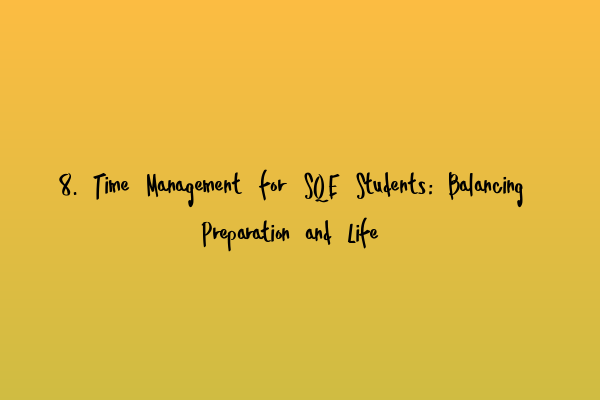Time Management for SQE Students: Balancing Preparation and Life
Studying for the Solicitors Qualifying Exam (SQE) can be a challenging endeavor that requires not only dedication and hard work but also effective time management. With the vast amount of material to cover and the pressure to perform well, it’s crucial for SQE students to find a balance between their exam preparation and personal life. In this article, we will provide you with some valuable tips and strategies to help you manage your time efficiently and optimize your SQE study routine.
1. Prioritize your tasks
One of the first steps to effective time management is prioritizing your tasks. Start by creating a to-do list of all the topics you need to cover and assignments you need to complete. Then, divide them into high, medium, and low priority tasks. Focus on completing the high priority tasks first, as they are typically the most important and time-sensitive.
Pro-tip: Consider using productivity apps or tools like Todoist or Trello to help you organize your tasks and track your progress. These tools can also send you reminders and notifications, ensuring that you meet your deadlines.
2. Create a study schedule
Establishing a study schedule is essential to efficiently manage your time. Allocate specific time slots dedicated solely to your SQE preparation. Determine which times of the day you are most productive and plan your study sessions accordingly. Be realistic about how much time you can commit each day or week and stick to the schedule.
Pro-tip: Break your study sessions into manageable chunks, and include regular breaks to rest and recharge your brain. For example, study for 50 minutes and take a 10-minute break in between.
3. Take advantage of your commute
Make the most of the time you spend commuting to and from work or university. Utilize this time to review flashcards, listen to audio lectures, or read SQE study materials. By utilizing these pockets of time effectively, you can significantly increase your overall study time without sacrificing other commitments.
Pro-tip: Download study-related podcasts or audiobooks to your smartphone and listen to them during your commute. This allows you to immerse yourself in the material while making your travel time productive.
4. Eliminate distractions
When it’s time to study, minimize distractions as much as possible. Find a quiet, well-lit space where you can focus without interruptions. Put your phone on silent mode or place it in another room to avoid temptation. Consider using website blocking apps to prevent access to distracting websites or social media platforms during your study sessions.
Pro-tip: If you find it challenging to stay focused for extended periods, try using the Pomodoro Technique. Set a timer for 25 minutes and work solely on your SQE tasks during that time. Then, take a short break before starting another Pomodoro cycle.
5. Stay healthy and take care of yourself
It’s important to remember that your physical and mental well-being greatly impact your ability to study effectively. Don’t neglect self-care activities such as getting enough sleep, eating nutritious meals, and engaging in regular physical exercise. Taking care of yourself will help you stay energized, focused, and productive.
Pro-tip: Incorporate exercise breaks into your study schedule. Go for a walk, do a quick workout, or practice yoga to refresh your mind and body. You’ll return to your studies feeling rejuvenated.
6. Seek support from study groups or tutors
Joining or creating study groups with fellow SQE students can be incredibly beneficial. Collaborating with others allows you to share knowledge, discuss difficult concepts, and hold each other accountable. Additionally, consider seeking support from tutors or mentors who can provide guidance and help you stay on track.
Pro-tip: Online platforms like SQE training forums or social media groups can be a great place to connect with like-minded individuals and exchange study resources and tips.
7. Stay motivated and celebrate achievements
Studying for the SQE is a marathon, not a sprint. It’s essential to stay motivated throughout the journey. Set small, achievable goals for yourself and celebrate milestones along the way. Rewarding yourself for completing tasks or reaching specific study targets will help maintain your enthusiasm and foster a positive mindset.
Pro-tip: Treat yourself to a small reward after completing a particularly challenging topic or finishing a study session. It could be anything from enjoying your favorite snack to indulging in a relaxing activity.
8. Learn from failures and adapt
Remember that failure is part of the learning process. If you encounter setbacks or don’t perform as well as you expected in practice exams, don’t get discouraged. Instead, reflect on your mistakes, analyze your study methods, and adapt your approach accordingly. Embrace the opportunity to improve and grow from your failures.
Pro-tip: Utilize SQE feedback and examiners’ comments to identify areas for improvement. Extract valuable insights from these evaluations to enhance your study strategy and focus on weak areas.
In conclusion, effective time management is integral to successfully preparing for the SQE while maintaining a balanced life. By incorporating these tips into your study routine, prioritizing tasks, creating a schedule, eliminating distractions, and taking care of yourself, you’ll be well-equipped to tackle the challenges that arise during your SQE journey.
For more insights into time management and other topics related to the SQE, check out our related articles:
- Mastering Time Management in SQE: Strategies for Efficient Exam Completion
- Conquer the Multiple Choice Questions (MCQ) in SQE1
- Mastering Effective Revision Techniques for SQE Success
- Scenario-Based Questions SQE2: Enhance Your Problem-Solving Skills
- Understanding SQE Feedback: Extracting Valuable Insights
We wish you the best of luck in your SQE journey!
